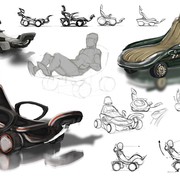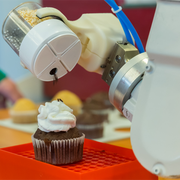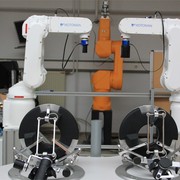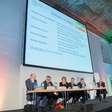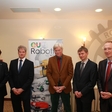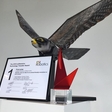
Biorobotics brings solutions that will render modern life much easier. During this year's European Robotics Week, which takes place 23 – 29 November 2015, attention will also be paid to biorobotics and important research projects in this field.
"Biorobotics is an important field that also receives a great deal of attention in Slovenian research, especially the Department of Automation, Biocybernetics and Robotics at the Jožef Stefan Institute. Humanoid robots, which resemble humans and are thus adapted to our environment, have already outgrown their childhood years and lessons in stable biped walking. The latest research in humanoid robots focuses on robotic vision, environment recognition and learning to move in an unknown environment. However, current robot developers not only imitate humans but also search for inspiration in the animal world," said prof. Tadej Bajd, President of the Slovenian Academy of Sciences and Arts and adds: "Although it may seem like science fiction today, future robots will find their place not only in industry but in our homes as well."
Prof. Matjaž Mihelj from the Laboratory of Robotics (Robolab) at the Faculty of Electrical Engineering, University of Ljubljana, has among others collaborated with researchers from the prestigious ETH University in Zurich in developing the exoskeleton ARMIN, which enables paralysed arm training and points to new opportunities of cooperation between man and the robot: "Robots are devices that represent a link between the digital and the physical world or rather machines that replace and upgrade human physical abilities. The aim of the robots is not to replace humans but to work with them in physical, social and cognitive interaction. Cooperation between man and the robot generates exciting new applications. Robotic surgical technology, such as the da Vinci Surgical System used at the Celje General Hospital, facilitate complex surgery procedures; rehabilitation robots enable patients to restore their motoric functions; robotic prosthetics and exoskeletons replace or improve human motoric abilities. All robotic technologies listed above have been used with success in Slovenia.
According to Prof. Leon Žlajpah from the Jožef Stefan Institute, the development in the field of robotics is also important for sport disciplines: "Robotics is also making its way into the sport field. The Jožef Stefan Institute has, for example, developed a skier robot which has attracted ma great deal of interest at home and globally, and provides an effective solution for the purposes of testing alpine and cross-country skiing equipment. We have also developed measuring equipment that facilitates biomechanical analysis of alpine skiing, with which we examine the effects of various parameters on the implementation of sport services, such as safety and prevention of sport injuries due to overuse," and adds: "Robotics is a fast evolving field and it is reasonable to expect that it will lead to major changes in some sport disciplines."
Nevertheless, on a global scale, the application of robotics is still largely confined to industry, where robots can replace humans in executing heavy, monotonous and dangerous tasks that often take place in inappropriate and unhealthy environment. According to the latest statistics of the International Federation of Robotics, industrial robot sales will grow 15% on average each year until 2018. Slovenia too is regarded a well automated country and its application of robotics in car industry makes it comparable to other European countries. In 2013, there was an average of 82 industrial robots per 10,000 persons employed in European production industry and 90 in Slovenia.
Slovenia will host the European Robotics Forum from 21 to 23 March 2016, under the aegis of euRobotics AISBL. The aim of the forum, which is the annual meeting point for eminent experts in robotics, researchers and economists from all over Europe, is to provide an overview of the past, current and future developments in robotics. The event is organised in partnership with the Faculty of Electrical Engineering, University of Ljubljana; the Jožef Stefan Institute; and the Slovenian Academy of Sciences and Arts (SAZU).
"Slovenia has been selected to host the event on the grounds of its committed involvement in the international research area and based on references of Slovenian scientists. By attracting the participation of internationally recognised authorities in the field of robotics, it is undoubtedly an important opportunity for Slovenian research partners and domestic industry," according to Prof. Marko Munih, Head of the Laboratory of Robotics (Robolab) at the Faculty of Electrical Engineering, University of Ljubljana.
